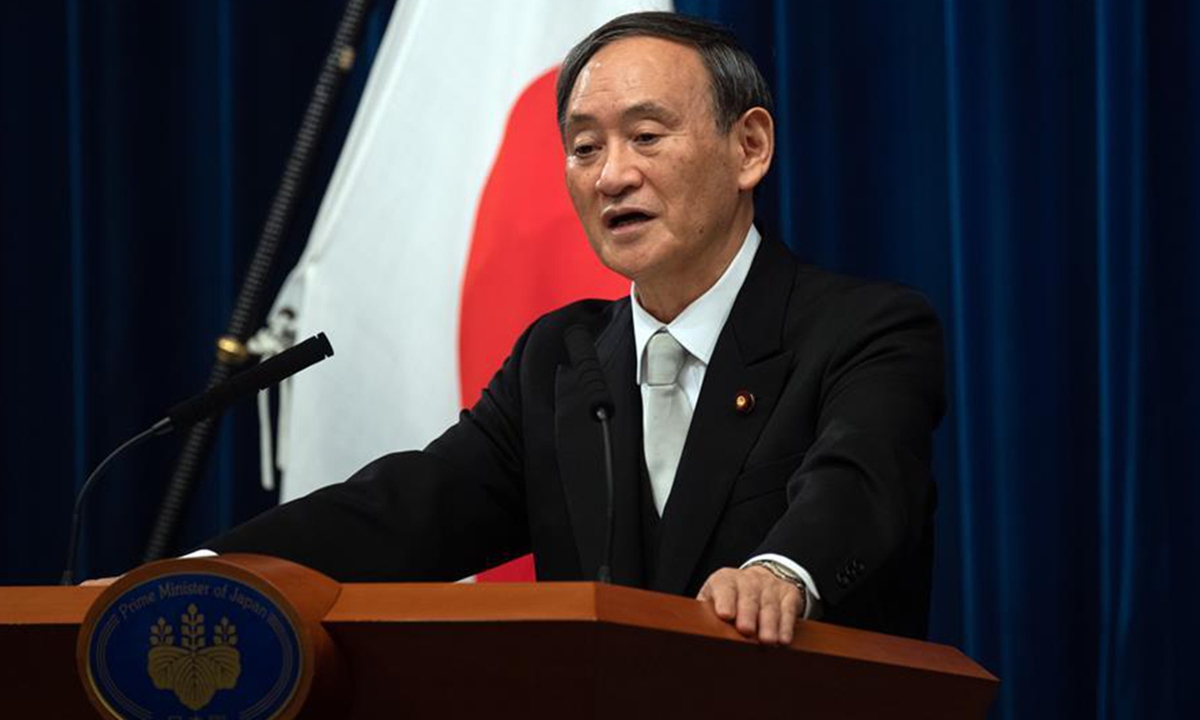Suga has to learn how to balance between two great powers
Source: Global Times Published: 2020/10/27 10:16:26

Yoshihide Suga Photo: Xinhua
Japanese Prime Minister Yoshihide Suga delivered his first policy speech on Monday. When reviewing his address, the Japan Times said it presented a "bolder domestic vision," but unchanged diplomacy in comparison to that of his predecessor, Shinzo Abe.
When sworn as Japan's prime minister in September, Suga pledged to press on with Abe-era policies. As Suga lacks diplomatic experience and he is not as powerful as Abe, he may not make remarkable breakthrough in foreign policy. It's expected that Suga will adhere to Abe's diplomatic philosophy, boost Japan's alliance with the US, and stabilize his country's ties with neighboring countries.
Abe in 2012 called for the formation of a "democratic security diamond" to safeguard the maritime commons with Australia, India, and the US. Suga continues to implement and promote this notion. Japan in early October hosted a meeting of foreign ministers from members of Quad, an informal security group made up of the US, Japan, Australia and India. The Malabar exercise, which Japan will take part in with the other three countries, will take place in November.
When talking about Japan's relations with China, Suga said a stable relationship with China is "very important." Under Abe, leaders of both countries agreed their bilateral ties should switch from competition to cooperation, which helped Japan's relations with China to gradually improve. It is expected that Suga will continue Abe's China policy. Suga underlined the significance of stabilizing relations with neighboring countries. Stable relations with China will play a crucial role in Japan's foreign policy, as China is a great power separated only by strip of water.
The Japanese media outlet said "compared to Abe's description of Japan-China relations, Suga dialed down the enthusiasm… without deploying phrases such as 'working to rebuild a new era of Japan-China relations' used by Abe."
Suga's slight adjustment of rhetoric toward China-Japan ties is not an indication he is considering changes to the current bilateral relationship, but mainly stem from pressure from the ruling Liberal Democratic Party. Members of the party seem to have failed to reach a consensus on how to cope with relations with China. Some hard-liners within the party are pushing the Japanese government to escalate its pressure on China in terms of how to deal with disputes in the East China Sea.
As a leader with a relative weak power base, Suga cannot work as powerfully as Abe and stand his ground. It is pretty difficult for him to balance these divergences. As a result, judging by his narrative, Suga seems not to be as enthusiastic about China-Japan ties as Abe. Compared with Abe's administration, Suga may walk back China-Japan ties.
However, as Suga has only been in office for over a month, it remains to be seen how ties with China will evolve.
When it comes to Japan's relationship with the US, Suga described the US-Japan alliance as the "cornerstone" of Japan's diplomacy and national security, which is identical as Abe administration's narrative. As tensions between Beijing and Washington escalate, how to deal with both giants has posed a great challenge to Tokyo.
Both countries are vital to Japan's peace and prosperity. However, as the US-Japan alliance is established by the Treaty of Mutual Cooperation and Security, Japan's bilateral ties with the US will take priority over those with China. Therefore, it remains to be seen how Suga can balance its relations with the two great powers.
The article was compiled by Global Times reporter Lu Yuanzhi, based on an interview with Lü Yaodong, a research fellow of the Institute of Japanese Studies, the Chinese Academy of Social Sciences. luyuanzhi@globaltimes.com.cn
Posted in: VIEWPOINT,ASIAN REVIEW